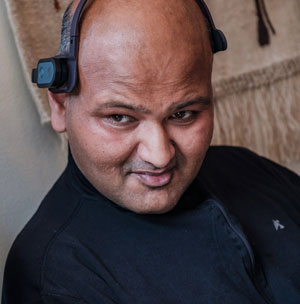Rahul Desikan, MD, PhD (1978-2019)
 It is with a very heavy heart that I write to share the sad news that Rahul Desikan, MD, PhD passed away late yesterday afternoon after a 2 ½ year, hard-fought battle with a rapidly-progressive form of ALS. Rahul was a deeply committed and caring husband and father, a brilliant neuroscientist and radiologist, and an inspiring friend and colleague beloved by many within and outside of UCSF.
It is with a very heavy heart that I write to share the sad news that Rahul Desikan, MD, PhD passed away late yesterday afternoon after a 2 ½ year, hard-fought battle with a rapidly-progressive form of ALS. Rahul was a deeply committed and caring husband and father, a brilliant neuroscientist and radiologist, and an inspiring friend and colleague beloved by many within and outside of UCSF.
Born in New Delhi, Dr. Desikan emigrated to Queens as a young boy. He attended the Bronx High School of Science, where upon graduating he won a scholarship to attend Boston University. As an undergraduate, he triple-majored in Neurosciences, Biology and Classics. He went on to obtain a PhD in Neuroanatomy and Neurobiology and to attend medical school at the same institution. After moving west to attend UCSD for Radiology residency, UCSF was fortunate to attract him in 2015 as a clinical fellow in neuroradiology. He joined the faculty as assistant professor of Radiology & Biomedical Imaging, Neurology and Pediatrics in 2017.
Fascinated by the intricacy of structure and function of the brain at an early age, Dr. Desikan dedicated his scientific career to understanding of the pathobiology of neurodegenerative illness and neurodevelopment. He received numerous accolades for his trailblazing research, including the Alzheimer’s Imaging Award and the Cornelius Dyke Memorial Award from the American Society of Neuroradiology, the Early Career Investigator Award and George Bartzokis Award from the Charleston Conferences in Alzheimer’s Disease, and the Junior Investigator Award from the National Alzheimer’s Coordinating Center.
Among his many contributions to neuroscience, Dr. Desikan is perhaps most well-known for the computational brain atlas that he developed while completing his PhD. The 2006 publication in Neuroimage detailing the “Desikan atlas,” an anatomic description of the brain’s surface that quickly became one of the most widely-used tools in the neuroscience community, has been cited more than 4500 times. Color figures of the atlas in its various forms still fill the pages of our leading scientific journals.
During his fellowship and as a faculty member in the UCSF Neuroradiology section, Dr. Desikan turned his focus to elucidating the genetic architecture of neurodegenerative disorders and how they define individual disease vulnerability. This led him to introduce a highly accurate polygenic hazard score for predicting the age of onset of Alzheimer’s disease. He also helped to delineate a shared genetic milieu between Alzheimer’s and cardiovascular disease, adding fuel to the idea that controlling blood lipid levels might delay or prevent the onset of dementia. His work helped to shed new light on genetic pleiotropy not only in Alzheimer’s disease, but also in ALS, Parkinson’s, frontotemporal dementia, bipolar disorder and schizophrenia. This work was the subject of the over 25 papers that he published since being diagnosed with ALS in high-impact journals including JAMA, Brain, Nature Scientific Reports, Nature Genetics and Acta Neuropathologica.
It was through a cruel twist of fate that in February 2017 Dr. Desikan was diagnosed with one of the very diseases that he studied. His physical function declined rapidly, to the point where he became “locked in,” able to communicate only by blinking and moving his eyes. His courageous battle with the disease was featured the Washington Post and Good Morning America, and through a series of meticulously crafted, thought-provoking op-ed pieces in the Washington Post, the San Francisco Chronicle and Scientific American. In his own powerful words:
Despite the loss of his ability to speak, walk and use his hands, he maintained an active research group, writing grants and manuscripts, and cultivating the careers of the young scientists who worked with him. He regularly mentored fellows and other junior faculty in neuroradiology, and was always willing to serve as a sounding board for ideas, even opening up his home for group meetings and faculty holiday gatherings. Through the end of his life, Rahul was vocal about the need for increased awareness and research funding for ALS.
Rahul will be remembered as quintessentially human. As beautifully profiled last year in Boston University’s Bostonia magazine, he was funny, humble, loving and wildly creative. Though his heartwarming impressions and endearing sense of humor, he had an uncanny way of making people laugh. He enjoyed and created stunning music as a DJ, continuing to compose music through his final days as a way to channel his own imagination and captivate the imaginations of his friends. In his perspectives and activities, Rahul inspired us all to be better people, to laugh, to enjoy, to be curious, to further science, to explore questions and to challenge the way neuroscience is studied. His spirit of optimism, humanity and gratitude left us in awe.
Rahul leaves behind his much-loved wife Maya Vijayaraghavan, MD, MAS, faculty member in the UCSF Department of Medicine, their two sons, Rabi and Amar, and his loving parents Veda and Krish and sister Vasudha. In lieu of flowers or other physical remembrances, their family asks that donations be made to the charitable organization I am ALS.
The UCSF Department of Radiology & Biomedical Imaging will hold a memorial on August 16, 2019 to honor, celebrate and remember the remarkable life of Dr. Desikan.
